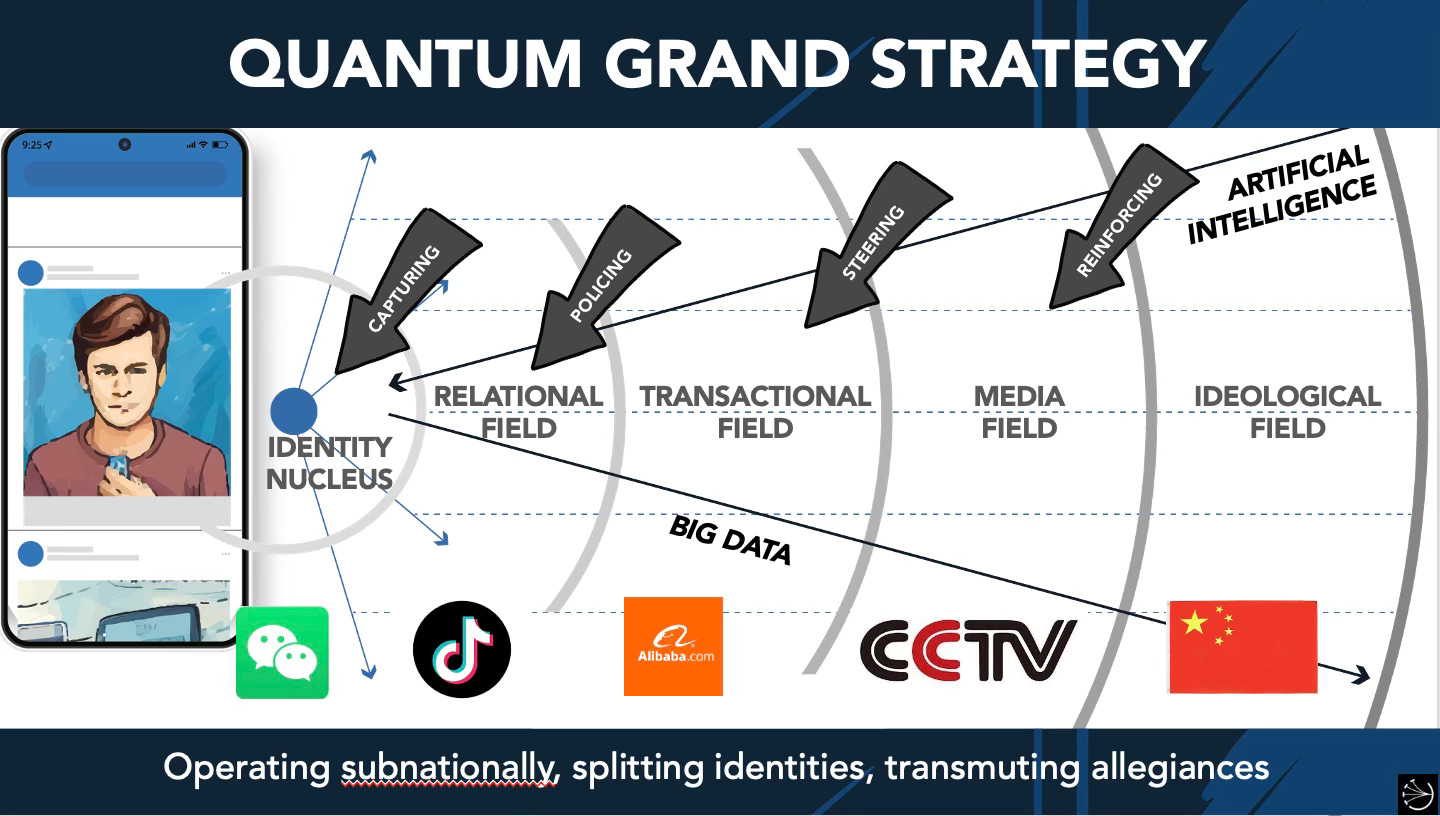[POST] The good that is Starlink's global expansion -- however engineered
This is what directly competing with China's digital colonization actually looks like, so don't avert your gaze
This is a reader-supported publication. I give it all away for free but could really use your support if you want me to keep doing this.
A truly well-balanced and well-reported piece by WAPO:
WAPO: U.S. pushes nations facing tariffs to approve Musk’s Starlink, cables show
Really, one of the single best newspaper articles that I have ever encountered.
America needs to compete with China in wiring up and networking up the Global South, because that is the Trojan Horse dynamic Beijing successfully employs to digitally colonize emerging markets the world over, befitting what I describe as the Chinese Communist Party’s quantum grand strategy:
Being the telecom and internet and cloud provider of choice gives China enormous entree to these nations’ information spheres, allowing them to collect all, analyze all, feed their AI development, and then use that enhanced understanding to win over the public’s trust while earning itself an ever expanding police surveillance capacity.
We’re not in a competition with China for military allies; there is no competition there.
Instead, we’re in a competition with China for network centrality throughout the global economy but especially across the Global South.
And so, when I hear of Trump and Rubio and our State Department pushing any and all trade partners to choose Starlink over any Chinese competitor — and then basically tie that decision to Washington’s attitude on bilateral trade going forward … I’m okay with that.
Is it bullying?
Economically and diplomatically, yes.
Does it symmetrize our approach to China’s approach in these situations?
Yes, yes it does.
Am I happy about seeing Musk benefit so directly following his DOGE stint?
No, I am not, but I can stomach it for the greater good.
From the story, which — again — is truly excellent in its reportage and broad framing:
Less than two weeks after President Donald Trump announced 50 percent tariffs on goods from the tiny African nation of Lesotho, the country’s communications regulator held a meeting with representatives of Starlink.
The satellite business, owned by billionaire and Trump adviser Elon Musk’s SpaceX company, had been seeking access to customers in Lesotho. But it was not until Trump unveiled the tariffs and called for negotiations over trade deals that leaders of the country of roughly 2 million people awarded Musk’s firm the nation’s first-ever satellite internet service license, slated to last for 10 years.
The decision drew a mention in an internal State Department memo obtained by The Washington Post, which states: “As the government of Lesotho negotiates a trade deal with the United States, it hopes that licensing Starlink demonstrates goodwill and intent to welcome U.S. businesses.”
Again, I don’t have a problem with this because this approach is simple and direct and what success has always looked like from the Chinese side, so why not take them on directly in this competition?
To me, this is effectively leveraging the power of America’s economic demand.
Do I agree with trying to get every state in the world to balance its trade with the US? No, that’s crazy and impossible and not worth achieving.
But, the tactic of linking a de-escalation of this tariff war-approach to this sort of market-entry “give” on the part of US trade partners around the world?
Again — not pretty but pretty straightforward.
Lesotho is far from the only country that has decided to assist Musk’s firm while trying to fend off U.S. tariffs. The company reached distribution deals with two providers in India in March and has won at least partial accommodations with Somalia, the Democratic Republic of Congo, Bangladesh, Pakistan and Vietnam, although this is probably not a comprehensive count.
A series of internal government messages obtained by The Post reveal how U.S. embassies and the State Department have pushed nations to clear hurdles for U.S. satellite companies, often mentioning Starlink by name. The documents do not show that the Trump team has explicitly demanded favors for Starlink in exchange for lower tariffs. But they do indicate that Secretary of State Marco Rubio has increasingly instructed officials to push for regulatory approvals for Musk’s satellite firm at a moment when the White House is calling for wide-ranging talks on trade.
I always hated the “separate lanes” approach we’ve long used with China where we refuse to barter across domains — as in, you do this economically and we’ll do this militarily or you do that technologically and we’ll do that diplomatically. That sort of cross-domain linkage is often the best path forward in a bilateral relationship, and Washington has too long eschewed such transactionalism, which, of course, is Trump’s calling card.
Understand: linking market access for a US tech firm to broader trade negotiations is a form of economic statecraft commonly used by major powers. The Trump Administration justifies this approach as necessary to ensure secure, reliable digital infrastructure and to prevent spreading Chinese influence.
Does the White House and State oversell the military threat — particularly in our hemisphere? Yes, but we are losing the battle for Latin America’s hearts and minds right now and that drives the hyperbolic language.
The Trump Administration’s approach appears to be effective in the short term, and strategically, it helps the US block Chinese digital expansion and embed American technology standards in key markets.
China is — most definitely — not standing still in response. It is rapidly building its own satellite networks and retaliating with countermeasures, including export controls and regulatory actions against US firms.
I also like the plain-English State Department take on the dynamic:
Asked for comment on the satellite firm, the State Department said in a statement: “Starlink is an American-made product that has been game-changing in helping remote areas around the world gain internet connectivity. Any patriotic American should want to see an American company’s success on the global stage, especially over compromised Chinese competitors.”
Can’t complain when Trump focuses more on the right competition with China and less so on the Taiwan showdown so beloved by the Pentagon.
Credit where credit is due.
But, yeah, it is sleazy as hell given Musk’s financial backing of Trump’s campaign and his insider role at DOGE.
Are we just playing down to China’s sleazy level?
Yeah, we are, but — again — I can live with that as an externality, because the great trust-busting of the Tech Bros and their companies also hangs out there as a Trump 2.0 possibility.
POLITICO: The Woman Leading the Surging MAGA Antitrust Movement
But, again, this is what normal, symmetrical competition with China is going to look like across the Global South.
Again, from the WAPO article:
“When Elon’s name is attached to anything, there’s all sorts of feelings. But if he weren’t the CEO of SpaceX, I don’t think most people would have a problem with the U.S. government advocating for American companies to get international market access,” said Evan Swarztrauber, a senior fellow at the Foundation for American Innovation, a technology policy think tank.
Swarztrauber added: “We want American satellite companies to do well abroad, especially as our main competition is China. The U.S. has a lead in space, and we should double down on getting other countries to grant regulatory approvals for our companies. Otherwise, it will be Chinese companies that benefit from market access.”
Also, again: I don’t like Musk and never will, but he’s on our side and, in IT and networking terms, we’re in an empire-building phase globally IF we want to prevent all that connectivity and network centrality defaulting to China.
“If you were a South African government official and this was before you, it’d be very difficult to separate,” said [W. Gyude] Moore, [a fellow at the Center for Global Development]. He added: “It might be that there’s nothing formal — that there’s no direct pressure on them — but people can conclude for themselves that Musk is close to Trump, and if I stall his business here, it could affect my country. They can see their life might be a lot easier if seen or perceived as getting along with Elon Musk.”
As I have penned here before: we are in a tricky time in which trust-busting the Tech Bros at home makes solid sense but so does letting them run wild globally on our market-access behalf. For now, I lean to the side of letting them run wild globally and then later cleaning up this mess at home — myself being more trusting of the Dems to do it right than the GOP’s MAGA types.
And, since that is clearly the approach of Trump 2.0, to me, then, it’s just a matter of radical acceptance and going with the flow.









An example: https://thomaspmbarnett.substack.com/p/china-switching-gears-on-latin-america
I get your point, but what about Musk's connection to China and Tesla? Isn't there a situation where China can manipulate and/or blackmail him with his Testa business? I don't trust Musk or MAGA/Trump one bit, with Trump profiting from this as well and further degrading our reputation around the world and here at home. The less people here respect the government, the greater the chance they will go with a more authoritarian form from either side. Why can't we use other companies and build them up for this purpose?
thanks,